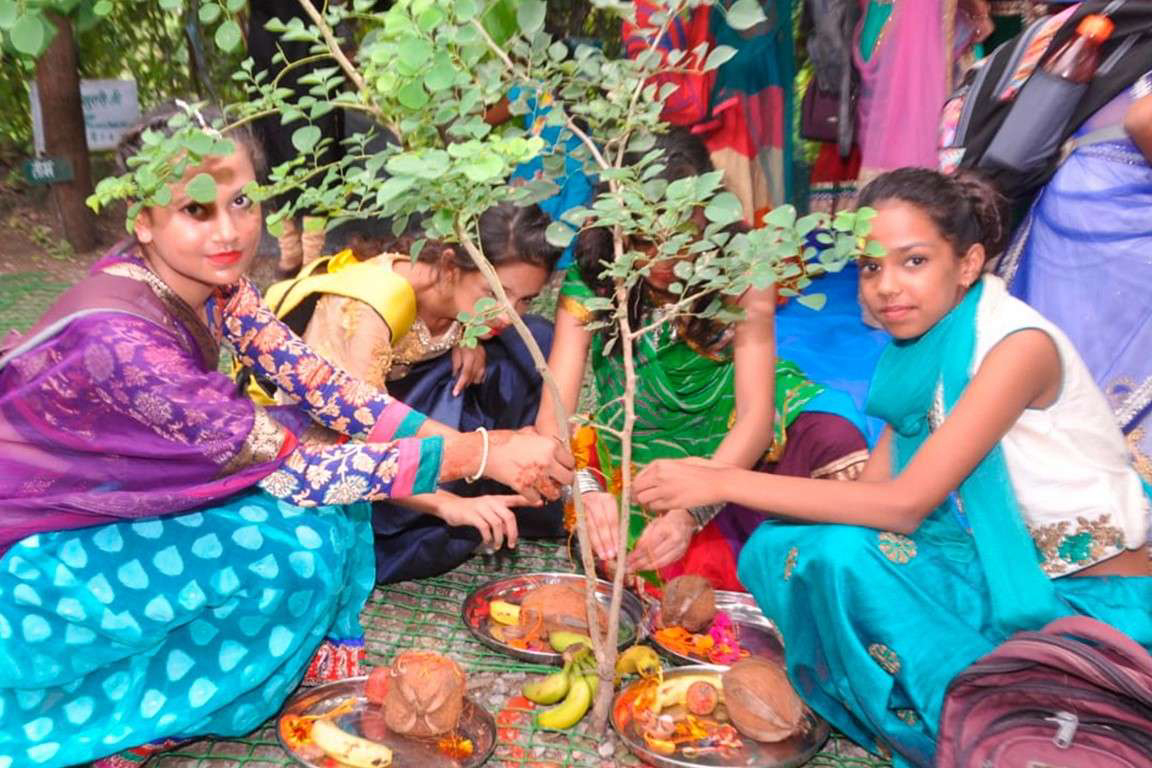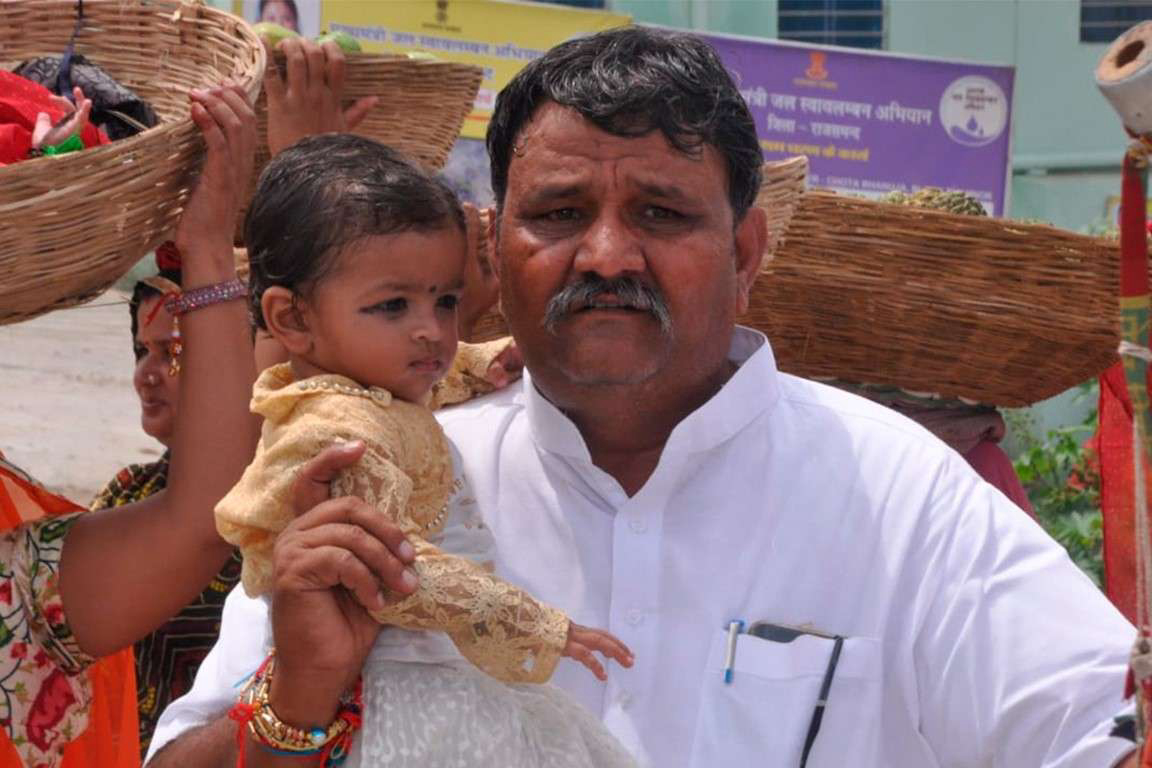
Nowadays, the talks about the protection of mother nature have been more active with the prospect of humankind hastily weakening in multiple aspects. The term mother nature that we often use, is a common personification of nature that focuses on the nurturing aspects of nature by symbolizing it in the feminine form of the mother. Even in ancient times, goddesses were worshipped for their association with nature, fertility, and agricultural blessings. Women held supremacy over aspects of Greek, Indian, Roman, Slavonic, and many other religions, before the inception of patriarchal beliefs. However, everything changed with time, and the honour of nature and the feminine energy were both lost. And now, when we are deliberately talking about gender equality and preservation of nature, a village from India is managing both the aspects at the same time. The people of Piplantri village of Rajasthan, India, have pledged to gradually plant 111 trees after a girl child is born in the village.
Planting trees after a girl child is born is one of the most notable decisions taken by any village in India because the largely unequal sex ratio and environment degradation are huge problems in the nation. The World Population Report 2020, has announced that the number of missing women is 14.2 crore globally, and 4.6 crore women are missing from India over the last 50 years. A study was published in the Journal Plos One, to strengthen policies that advocate for gender equality and the introduction of support measures to counteract existing gender biases. According to this study, an estimated 6.8 million fewer female births will be recorded across India till 2030, if the persistent use of selective abortions won't stop. Even if sex selections is prohibited by law in India, numerous cases are found every year in this matter. Shyam Sundar Paliwal, the man behind the idea of planting trees for a girl child, already knew about what used to happen in Piplantri when a baby girl was born. A family member would shove a rocky grain into her mouth, that would naturally be sufficient to come to an infection that led to the baby's death. After Paliwal lost his 16-year-old daughter in a tragedy in 2006, he pledged that there would be no more deaths of a girl child. Paliwal marked his daughter's death by planting a tree and he went on to channel his grief into an incredible mission.

Source: upm.com
The birth of a baby girl is now celebrated with the planting of 111 trees. As the elected village head or the Sarpanch, Paliwal's word and passion carried weight at that time. And now on one selected day, every monsoon, new mothers spread red fabric inside a huge basket. Then they lay their baby girls inside and carry them to the spot where the new saplings are to be planted. The entire village of Piplantri regularly monitors the girl children who have been born in past years
Numerous villagers care for the trees and protect them from diseases by planting aloe vera around the trees. When the family begins planting the 111 trees, they agree to continue to care for the trees and also sign a legal affidavit promising to completely educate their female child and prevent her marriage before the age of 18. The terms of the affidavit include that the girl will not be married until she has received a complete education, she reaches the legal age, and the 111 trees are planted in her honour and properly looked after by the family. Apart from all the parental efforts, village members likewise honour the female child and invest in her future. The locals together raise a trust fund of Rs 21,000 for the child and the parents add Rs 10,000 in it. The 31,000 Rupees are maintained in a Fixed Deposit account (FD) that the child will be permitted to withdraw when she enters the age of 20. The FD account is resolved for the assurance that the female child will benefit families' capacity to avoid the early marriage of their female children.
Another scheme titled ‘Bhamashah Scheme’ was similarly launched in the Piplantri village to bring financial inclusion and empowerment of women. This scheme is a family-based programme in which a bank account and a Bhamashah Card are made in the name of the lady of the house. And this helps to empower the women of the village to become the decision-makers in the family. Paliwal has also adopted a letter of oath for his village, known as the Kiran Nidhi Scheme, started by social worker Anna Hazare. Paliwal made several inclusions to the scheme to reflect the altering needs of the times and to ensure the extensive growth of the girl child, not just at school, but at home as well. This oath from the parents is taken on a stamp paper and includes multiple conditions like educating the daughters and the planted trees being the property of the village.
All the funds accumulated by the parents and donors would grow to be a few lakh rupees after 18 to 20 years. The funds would be beneficial in education, and the saplings planted would have become trees by the time the girls reaches the legal age. The oxygen created by the trees and the soil and water gripped by its roots would be incredibly valuable. Since 2006, the entire village has planted several species of trees that create revenue for the village such as neem, mango, Sheesham, amla and many more. The villagers also celebrate an annual festival and the Raksha Bandhan festival with the trees. The villagers have planted around 286000 trees and they care for all the trees and protect them as well.

Paliwal visualized a bright future for the girls and gave rise to a huge change and he also made a good start by collaborating with multiple government schemes with the implementation of a remarkable plan. The village Panchayat won many awards for the execution of multiple schemes and this encouraged the villagers to adopt Paliwal's idea of planting 111 trees effortlessly. He faced many problems initially, but somehow, he convinced the villagers that if the parents of a baby girl planted trees and nurtured them for 18 years, they could arrange enough money for the girl's wedding when she comes of legal age. The desire of collecting money for girl's marriage can sound stereotypical to some people, but it is a creative tactic which works as an alternative and constructive way of breaking the centuries of patterns. The simple act of planting trees to celebrate the birth of a girl occurred as an effective way of expressing beliefs about girls being burdens by remaking the event into an investment for the future. This move developed a concern for girls, educating the community the significance of having girls while prohibiting future unhealthy practices. And considering such good longer-term outcomes can help society to become respectful towards women.
________________________
Reference:
- www.upm.com
- www.theguardian.com
- www.wikipedia.org
